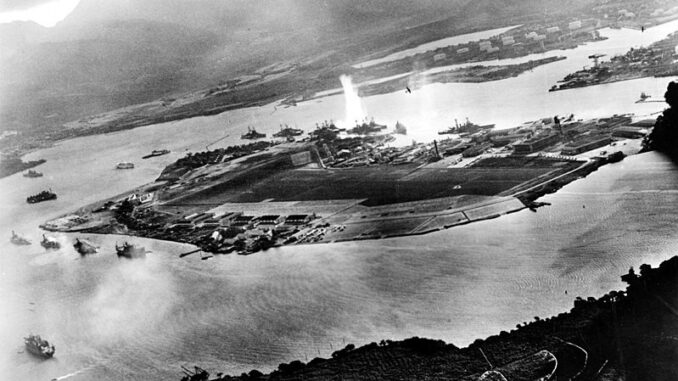
Few events alter the course of history by themselves. History is usually the combined result of many minor, unremarkable, everyday occurrences that may or may not have made it onto the evening news. Bigger stories take time to gather steam and build inertia. They’ll be in the news for awhile until they inevitably fade, replaced by another bit of soon-to-be forgotten history. Then there are the dambusters: news so earthshaking we still remember them every year, decades (and in rare instances, centuries) later.
Pearl Harbor, December 7, 1941 is one of those watershed events that compelled people all over the world to stop whatever they were doing and listen intently to radio news broadcasts. In the United States, deep anger and fear turned to steadfast resolve that saw us through to the end of the war. News stories of thousands killed or injured stirred outrage and hate; a dastardly sneak attack; sailors forced to jump from their burning and exploding ships into water covered with burning oil; numerous burn victims; young men who never stood a chance went down with their ships; civilians strafed and bombed. Most Americans had wanted to stay out of the war. December 7 transformed that desire to remain neutral in an instant, changing the course of the nation and the fate of the world.
For the Imperial Japanese Navy (IJN), Pearl Harbor was a sensational, lopsided victory, if only a tactical one. Had the IJN caught the American aircraft carrier fleet at anchor, a strategic victory would have been all but assured. The Japanese would have had several relatively unhindered years to seize everything in the Indo-Pacific they desired, more than enough time to seize the natural resources – including oil and rubber – they required to feed their war machine. Still, it might have been possible to defeat them, but it would have taken much, much longer at a far greater cost.
It seems unlikely, or certainly less likely, that the United States would have entered the war had it not been attacked at Pearl Harbor. It seems equally unlikely that the Allies could have defeated the Axis without America. (Not to take anything away from what each individual Allied country did during the war – all efforts and sacrifices were vitally important.) Thus, Pearl Harbor can be viewed as the reason the Allies won and the Axis lost. The world would be profoundly different today had it not been for the attack on Pearl Harbor, and not in a good way. It’s been argued that America would have entered the war even without the tragedy at Pearl, and that may possibly be true. But the US would have delayed entry as long as possible, and would have lacked the resolve and unity that Pearl generated. A later entry into the war would probably have been too late.
Pearl Harbor was a monumentally important inflection point in history, a sacrifice that we should all be grateful for even as we pay our respects to those who gave all, for all of us.
